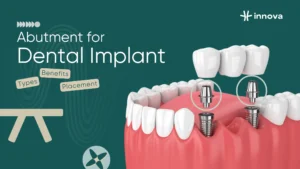Your teeth play a crucial role in your overall health and confidence. While dental problems can develop gradually, recognizing the warning signs early can save you from complex treatments and higher costs down the road.
Dental implants are the gold standard for tooth replacement, offering a permanent solution that looks, feels, and functions like natural teeth. Unlike bridges or dentures, implants replace both the tooth and root, preventing bone loss and protecting your facial structure.
If you’re experiencing any of these 8 warning signs, it may be time to consider dental implants.
1. You Have One or More Missing Teeth
The most obvious sign you need dental implants is missing teeth. Even losing a single tooth creates problems that go far beyond appearance. When you have gaps in your smile, the remaining teeth start shifting into those empty spaces, which can throw off your entire bite alignment.
Missing teeth also trigger jawbone deterioration because there’s no tooth root to stimulate the bone. This bone loss happens gradually, but it can change your facial structure over time and make it harder to place implants later. The sooner you replace missing teeth, the better your long-term oral health will be.
2. You Experience Persistent Tooth Pain or Have Severely Damaged Teeth
If you have a chronic toothache that just won’t go away, despite trying pain relievers and seeing your dentist, it could signal that the tooth is beyond saving. Sometimes deep decay, infected roots, or cracks below the gumline make it impossible to restore a tooth successfully.
Teeth with vertical cracks that extend below the gum line, extensive decay that’s destroyed most of the tooth structure, or repeated infections that keep coming back despite treatment might need to be extracted. When root canals or other treatments can’t resolve the pain, your dentist might recommend extraction followed by an implant. This eliminates the source of infection and gives you a permanent, pain-free replacement.
3. Your Teeth Feel Loose or Are Shifting
Adult teeth should be rock-solid in your mouth. If you notice any looseness when you touch a tooth with your tongue or if your teeth seem to be changing position, this is a serious red flag. Loose teeth usually indicate advanced gum disease or significant bone loss around the tooth roots.
Unfortunately, once teeth become loose, they rarely stabilize on their own. The longer you wait, the more likely you’ll lose multiple teeth as the problem spreads. Getting ahead of this with implant treatment can often save your remaining healthy teeth.
4. You’re Having Trouble with Your Dentures
Many people assume they just have to live with uncomfortable, ill-fitting dentures, but that’s not true. If your dentures slip when you’re eating or talking, create painful sore spots, or force you to use messy adhesives every day, implants can solve these problems permanently.
Implant-supported dentures stay firmly in place and feel much more natural than traditional ones. You’ll be able to eat foods you’ve been avoiding and speak with confidence again. Many patients say it’s like getting their real teeth back.
5. You Have Difficulty Chewing or Eating
When dental problems start affecting what you can eat, it’s time to take action. You shouldn’t have to avoid apples, steaks, nuts, or other nutritious foods because your teeth can’t handle them. If you find yourself chewing mainly on one side or cutting everything into tiny pieces, your quality of life is suffering unnecessarily.
Dental implants restore your full chewing power, so you can enjoy all your favorite foods again. Unlike dentures that only give you about 25% of normal bite force, implants let you bite and chew with nearly the same strength as natural teeth.
6. You Notice Facial Changes and Sunken Appearance
One of the most dramatic effects of tooth loss is how it changes your face. When teeth are missing, the jawbone starts shrinking because it’s no longer being stimulated by tooth roots. This bone loss can make your cheeks look sunken, create deep wrinkles around your mouth, and give you a prematurely aged appearance.
Dental implants are the only tooth replacement option that prevents this bone loss. The implant functions like a natural root, maintaining the health of your jawbone and preserving your facial structure. Many patients are amazed at how much younger they look after getting implants.
7. You Have Chronic Bad Breath Despite Good Hygiene
If you brush, floss, and use mouthwash regularly but still struggle with persistent bad breath, there might be hidden infections in your mouth. Deep decay, infected tooth roots, or bacteria trapped in areas you can’t clean properly can cause ongoing halitosis that just won’t go away.
Sometimes the only way to eliminate these infection sources is to remove the problematic teeth and replace them with clean, sterile implants. This gives you a fresh start and can finally resolve chronic bad breath issues.
8. You Feel Self-Conscious About Your Smile in Social Situations
If you find yourself covering your mouth when you laugh, avoiding photos, or feeling embarrassed about your teeth in professional or social settings, your dental problems are affecting more than just your health. This self-consciousness can impact your career opportunities, relationships, and overall quality of life.
Many people don’t realize that feeling embarrassed about your smile is a valid reason to consider dental treatment. Your confidence and mental well-being matter just as much as your physical health. Dental implants can restore not just your teeth, but also your willingness to smile freely and engage confidently with others.
When Should You See a Dental Implant Specialist?
If you recognize yourself in any of these descriptions, don’t put off getting professional advice. Dental problems rarely resolve on their own, and waiting usually makes treatment more complex and expensive.
Early intervention gives you several advantages. Your bones and gums are typically healthier, which means simpler procedures and better healing. You’ll also avoid the cascade of problems that happen when dental issues are left untreated, like additional tooth loss or the need for extensive bone grafting.
Most importantly, you don’t have to live with pain, embarrassment, or dietary restrictions when effective solutions are available.
Frequently Asked Questions
How long do dental implants last?
With proper care, dental implants can last 25-30 years or more. They have a 95-98% success rate when placed by experienced professionals.
Are dental implants painful?
Most patients are surprised by how comfortable the procedure is. You’ll have local anesthesia during surgery, and any post-operative discomfort is typically manageable with over-the-counter pain medication.
Am I a good candidate for implants?
Most people with missing or failing teeth are candidates for implants. The main requirements are adequate bone density, good overall health, and a commitment to maintaining proper oral hygiene.
What if I don’t have enough bone?
Bone grafting procedures can often build up areas where bone has been lost. Modern techniques make this a routine part of treatment when needed.
How much do dental implants cost?
Costs vary depending on your specific needs. We offer financing options and work with insurance companies to help make treatment affordable. Think of implants as an investment in your long-term health and quality of life.
Ready to Take the Next Step?
If you’re experiencing any of these warning signs, the team at Innova Dental Implant Institute in Brunswick, Georgia can help. Dr. Dexter W. Mattox specializes in dental implant solutions and will work with you to create a treatment plan that fits your needs and budget.
Call (912) 266-8100 today to schedule your consultation and take the first step toward restoring your smile and confidence.






